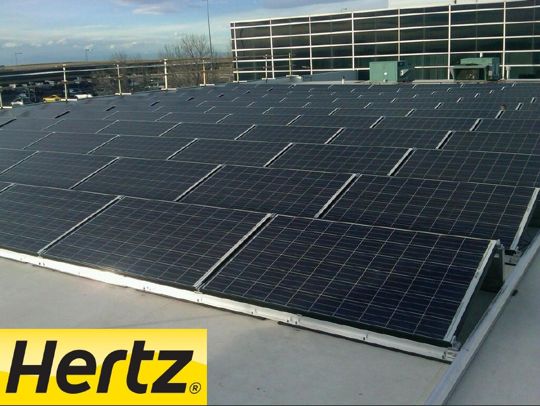 Rental car stalwarts, The Hertz Corporation (Hertz, NYSE:HTZ) revealed plans to install 2.3 megawatts (MW) of solar photovoltaic systems at sixteen locations across the U.S. this year.
Rental car stalwarts, The Hertz Corporation (Hertz, NYSE:HTZ) revealed plans to install 2.3 megawatts (MW) of solar photovoltaic systems at sixteen locations across the U.S. this year.
As the first piece of their solar initiative, Hertz completed construction of a 235 kilowatt system — that’s about the size of 60 typical U.S. home solar installations — on the rooftop of their Denver International Airport business (image below). According to a company press statement, that single system is expected to “produce 342,766 kilowatt-hours of AC output and will offset approximately 650,000 pounds of CO2 annually.”
Hertz plans to install fifteen other solar power generating systems, also rooftop installations, in facilities in Arizona, California, Colorado, Georgia, Maryland, Massachusetts New Jersey, New York, and Pennsylvania before the end of September 2011.

Richard Broome, Senior Vice President of Hertz, told TechCrunch:
“We went into this, obviously, thinking this would be environmentally sound. But to move ahead we needed it to be a financially positive thing, too.
The timing was also right for this. We’re taking full advantage of a range of federal and local grants and rebates on this, including the Treasury’s 1603 program.
Over the long term of this project, we anticipate a positive return on investment on the millions of dollars, and to see ROI in five to seven years.”
Broome would not confirm a total budget for Hertz’s solar initiative in the U.S..
Based on the company’s disclosure that it is installing some 2.3 megawatts of multi-crystalline solar photovoltaics, however, and drawing on pricing research from Solarbuzz, TechCrunch estimates that the company will spend up to $10 million on its first sixteen solar installations.
Multi-crystalline panels in the commercial solar U.S. market are priced at about $2 right now, and industry norms would add another $2 for labor, racking and other installation costs. Federal rebates could cover about 30 percent of those costs, and Hertz could find more support from state and local programs, as well.
Generating its own electricity could help Hertz weather the transition of its fleets from gasoline models to hybrid plug-in and all-electrics. In late 2010, the company announced plans to rent electric vehicles (EVs) by the hour to customers in densely populated urban areas and campuses.
Broome confirmed that Hertz is buying its solar photovoltaics from SolarFun (a.k.a. Hanwha SolarOne) a Chinese company; and has hired Portugal-based MartiferSolar to complete designs and installations; also retaining project management services from New York-based Global Solar Center for this project.
Global Solar Center was founded by chief executive Jack Hidary, a clean tech advocate, serial entrepreneur and former CEO of Dice.com. Hidary chairs and invested in another New York City startup Samba Energy led by his brother, Michael Hidary.
Samba Energy provided solar and investment analysis, and enterprise software — Samba SunSpotter — that will be used to help Hertz manage solar installations across U.S. facilities, ongoing. The company was founded in 2009, and is angel backed by undisclosed investors. It aims to help companies that have a multitude of facilities (Hertz has thousands in the U.S. alone) automate analysis of their expenses and returns on clean energy installations.